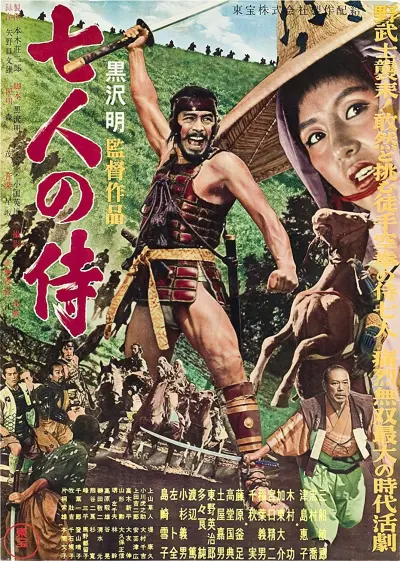
Oh, we're diving into a bona fide classic here: ".Shichinin no samurai."—or as it's known in English, "Seven Samurai." Directed by the legendary Akira Kurosawa, this epic samurai drama from 1954 is as much about the clashing of swords as it is about the clashing of social classes and the very essence of human nature.
At the heart of "Seven Samurai" is a simple yet weighty scenario: a small, impoverished village constantly pillaged by bandits decides to fight back by hiring samurai to protect them. What unravels is a narrative about the strategic accumulation of a disparate band of seven samurai warriors, each with his own skills and personal baggage. Set in the Sengoku period, a time rife with conflict, the film not only provides a substantial background for each character but also depicts the universal struggles of the human condition, mirrored in the villagers' and samurai's lives alike.
There's this beautiful dichotomy throughout the film, illuminating the chasm between the peasant class and the samurai. Yet, the line blurs as they fight for a common cause. We see themes of loyalty, courage, and sacrifice mingling with the harsh realities of socioeconomic structures and existential despair. The villagers are not just seeking protection; they're striving for dignity. The samurai, while initially motivated by their own needs—be it for food, honor, or redemption—grow to embody the very essence of selflessness.
Kurosawa was a master of cinematic language, and his storytelling in "Seven Samurai" is no exception. Through intricate plot developments and meticulously choreographed battle scenes, the story unfolds to reveal the human soul, stripped down to its core. One of the most poignant aspects is the portrayal of the samurai who find themselves obsolete in a changing world, figuring that their skills, once indispensable, are now for hire to the highest bidder—or in this case, the neediest.
"Seven Samurai" also explores the cost of war and conflict, delving into the consequences of violence on the human spirit. Each skirmish, each tactical maneuver, tells a smaller tale within the larger epic—a study of stratagem, camaraderie, and the price paid in blood and tears. The individual stories of the samurai are interwoven with the narrative of the village, resulting in a rich tapestry that presents warfare not just as a physical battle, but as an emotional and philosophical journey, too.
The film's conclusion—one filled with both triumph and tragedy—leaves us to ponder the true meaning of victory and the ephemeral nature of life. The final frames, lingering on the graves of the fallen samurai, overlook a village they saved but cannot partake in its future. This bittersweet ending captures the ephemeral glory of the warrior and the enduring grit of those who continue in the aftermath. Kurosawa doesn't just tell a story; he presents a canvas where the multiple shades of human courage, sacrifice, and the relentless passage of time are depicted, ensuring "Seven Samurai" remains immortalized in the annals of cinematic history.
At the heart of "Seven Samurai" is a simple yet weighty scenario: a small, impoverished village constantly pillaged by bandits decides to fight back by hiring samurai to protect them. What unravels is a narrative about the strategic accumulation of a disparate band of seven samurai warriors, each with his own skills and personal baggage. Set in the Sengoku period, a time rife with conflict, the film not only provides a substantial background for each character but also depicts the universal struggles of the human condition, mirrored in the villagers' and samurai's lives alike.
There's this beautiful dichotomy throughout the film, illuminating the chasm between the peasant class and the samurai. Yet, the line blurs as they fight for a common cause. We see themes of loyalty, courage, and sacrifice mingling with the harsh realities of socioeconomic structures and existential despair. The villagers are not just seeking protection; they're striving for dignity. The samurai, while initially motivated by their own needs—be it for food, honor, or redemption—grow to embody the very essence of selflessness.
Kurosawa was a master of cinematic language, and his storytelling in "Seven Samurai" is no exception. Through intricate plot developments and meticulously choreographed battle scenes, the story unfolds to reveal the human soul, stripped down to its core. One of the most poignant aspects is the portrayal of the samurai who find themselves obsolete in a changing world, figuring that their skills, once indispensable, are now for hire to the highest bidder—or in this case, the neediest.
"Seven Samurai" also explores the cost of war and conflict, delving into the consequences of violence on the human spirit. Each skirmish, each tactical maneuver, tells a smaller tale within the larger epic—a study of stratagem, camaraderie, and the price paid in blood and tears. The individual stories of the samurai are interwoven with the narrative of the village, resulting in a rich tapestry that presents warfare not just as a physical battle, but as an emotional and philosophical journey, too.
The film's conclusion—one filled with both triumph and tragedy—leaves us to ponder the true meaning of victory and the ephemeral nature of life. The final frames, lingering on the graves of the fallen samurai, overlook a village they saved but cannot partake in its future. This bittersweet ending captures the ephemeral glory of the warrior and the enduring grit of those who continue in the aftermath. Kurosawa doesn't just tell a story; he presents a canvas where the multiple shades of human courage, sacrifice, and the relentless passage of time are depicted, ensuring "Seven Samurai" remains immortalized in the annals of cinematic history.

